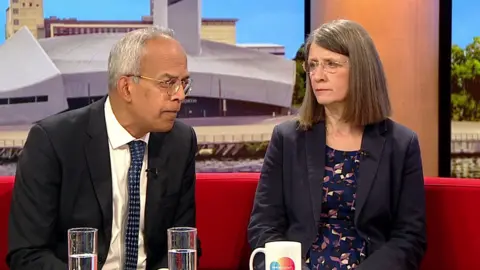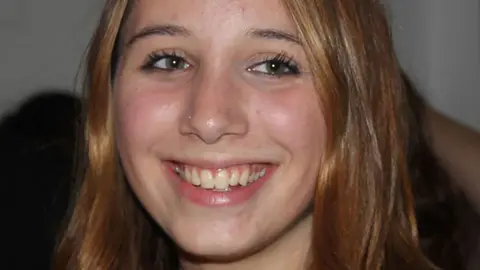 Family handout
Family handout
Alice Figueiredo’s family said the trial showed “the trust’s failings for what they were”
Warning: This article contains upsetting details and references to serious self-harm and death
The family of a young woman who died on a mental health unit have said the trial of the hospital trust and staff member was “heartbreaking and devastating”.
Alice Figueiredo, 22, was being treated at Goodmayes Hospital in Ilford when she took her own life in July 2015.
On Tuesday, North-East London Foundation NHS Trust was fined more than £565,000 after being found to have not done enough to prevent her death. Ward manager Benjamin Aninakwa, 53, was given a six-month suspended sentence and 300 hours of community service.
Alice’s mother Jane Figueiredo and her husband Max Figueiredo told BBC Breakfast it had been helpful for them to hear the failings of the trust exposed.

Max and Jane Figueiredo spoke on BBC Breakfast about how they have been left feeling
“We had to listen to a lot of misinformation during the trial and the impression given that things had been done properly,” said Ms Figueiredo.
But, she said, ultimately “the failings were shown up for what they were”.
“It was helpful for us to hear it named for what it was.”
Ms Figueiredo killed herself using bin bags from a shared toilet, having previously made many similar attempts.
The hospital had previously acknowledged the risk to patients of keeping bin bags on the ward.
They were subsequently taken out of patient bedrooms however despite warnings from Alice’s family, they were not removed from the communal toilet, which was left unlocked.
An Old Bailey jury found the trust had broken section 3 of the Health and Safety at Work Act, by failing to ensure that she had not been not exposed to risks to her health or safety. It was also ordered to pay £200,000 in legal costs.
Aninakwa was found to have failed to take reasonable care for the health and safety of Alice.
 Figueiredo family
Figueiredo family
Alice Figueiredo was in the care of Goodmayes Hospital
Reflecting on the events that led to Alice’s death, her mother said: “I think it became really clear quite early that something didn’t feel right on that ward.”
She said the family knew the ward well as her daughter had been there at some point every year since 2012.
But during her daughter’s last admission, things felt more “chaotic”, she said.
“We felt very early on that things didn’t feel safe.”
She said she visited her daughter almost every day, and found that “she was mainly left with temporary staff who did not know her daughter very well.
“Some staff were rude, dismissive – didn’t treat her well – and worse.”
“It set back her recovery,” she added.
“You place a great deal of trust in the institution keeping your child safe – you come away after such a tragedy and realise that faith was misplaced,” said Alice’s stepfather Max.
“To provide your daughter with the means to end her life on 19 occasions, is quite shocking.”
Looking back at Alice’s death, the investigation and the trial, he said he “can’t imagine” anyone else ever going through the same process “because for us it’s heart-breaking, it’s devastating”.
‘Reflect on the verdict’
Following the trial, the Trust issued a statement which said: “Our thoughts are with Alice’s family and loved ones, who lost her at such a young age.
“We extend our deepest sympathy for the pain and heartbreak they have suffered this past ten years.
“We will reflect on the verdict and its implications, both for the Trust and mental health provision more broadly as we continue to work to develop services for the communities we serve.”
Listening to the statement, Ms Figueiredo said she felt the response was “weak”, adding: “There’s nothing reassuring in that for us.
“They’ve had 10 years to think about it,” she added.
If you are affected by any of the issues raised in this story, support and advice is available via the BBC Action Line.

